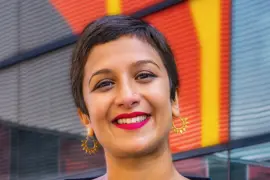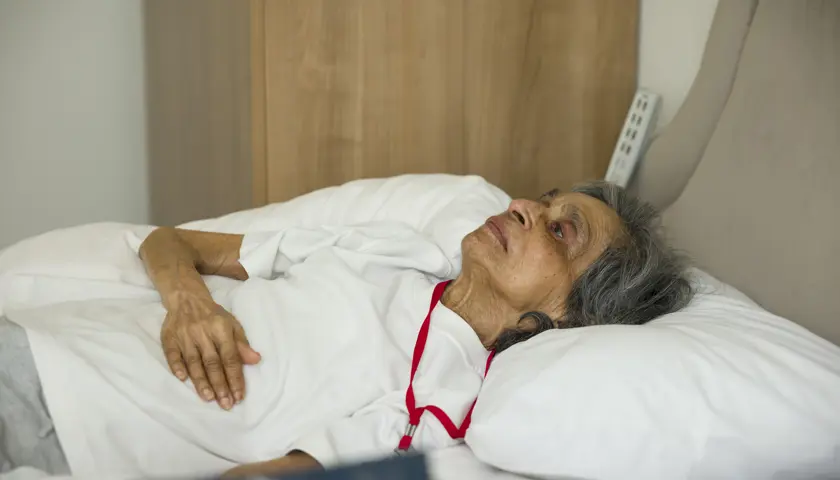
The lost art of listening
Minoritised groups often feel as if doctors in the NHS sometimes do not take their issues seriously, says Rageshri Dhairyawan in her book Unheard: the medical practice of silencing. She explains to Seren Boyd how important it is to amplify patients’ voices if the right care is to be received
Rageshri Dhairyawan’s mother always dresses up to see her own doctors.
She wants to show respect but also, as a South Asian woman of a certain age, she feels she needs ‘more status’ – despite having been a GP in the NHS for 40 years.
Likewise, when she is a patient, Dr Dhairyawan (pictured above) makes a point of ‘slipping in within the first minute that I’m a doctor, too’. Mother and daughter have grown used to asserting themselves gently, needing to earn credibility, in their personal and professional lives.
However, as a consultant in sexual health and HIV medicine in east London, Dr Dhairyawan is more worried about how these things affect her patients. She noticed early on that many of the people she was treating with advanced HIV disease were from ethnic minorities.
Through years of research and advocacy, she has grown to realise many patients are ‘underserved’ by the health service – especially (but not exclusively) those from minoritised groups. They fall through the cracks, are not taken seriously and often disengage.
We must learn to listen better and make it safe for people to voice their concerns
Dr Dhairyawan
The diagnosis she reaches in her new book, Unheard: the medical practice of silencing (Trapeze), is that medicine has lost the art of listening. And if it is to tackle health inequalities, it must relearn it, urgently.
‘Healthcare itself can cause inequities to worsen,’ she writes. ‘It’s less safe for some people than others. This is a huge injustice.’
Racial health inequalities are just one example in Unheard but the racism so often at their root creates such a chasm between doctor and patient that the consequences can be devastating.
It often starts with stereotyping, Dr Dhairyawan says: doctors dismissing Asian women with unexplained pain as having ‘Mrs Begum Syndrome’, or typecasting black women as ‘dramatic’. A report in June 2024 found BAME (black, Asian and minority ethnic) patients on a maternity ward at University Hospitals Birmingham were called ‘Asian princesses’ when they asked for pain relief.
Unheard begins with Dr Dhairyawan’s personal account of being hospitalised with severe pain during IVF treatment and her pleas for more pain relief being ignored. Being a ‘small Asian woman’ made her an ‘unreliable narrator’ with a ‘credibility deficit’, she concludes.
Such attitudes are dangerous. Patients not being listened to is a recurrent theme of investigations into why black women in the UK are four times more likely to die in pregnancy than white women, for example.
A 2021 inquiry found that avoidable deaths among patients with sickle cell disease, which primarily affects people of African and Caribbean heritage, were strongly associated with patients being ‘treated with a lack of respect or prioritisation and undermined or disbelieved’.
Little wonder, then, that patients respond with mistrust, disengagement, low vaccination take-up – a vicious cycle that deepens health inequalities.
‘We cannot rely on people being brave and speaking up,’ says Dr Dhairyawan. ‘We must learn to listen better and make it safe for people to voice their concerns.’
Treating people
But healthcare has another fundamental problem, Dr Dhairyawan believes.
A paternalistic, ‘doctor knows best’ attitude is instilled from the very start of medical school, Unheard argues.
The formulaic approach to taking a history, guiding the conversation through a set format of questioning towards the goal of diagnosis, excludes the opportunity to listen closely to patients’ concerns, motivations and priorities.
‘And if they don't present in the way that we’ve been taught they should, we’re instantly suspicious of them,’ she says.
Medicine tends to pay more attention to test results and research trials than the patient. And the doctor-patient relationship becomes transactional: ‘People come with something that’s “broken” and we “fix” it.’ Doctors’ detachment is also seen as necessary self-preservation.
Looking back, Dr Dhairyawan feels that, when she left medical school, she ‘had the skills to diagnose and treat disease’, but not ‘how to treat people’.
Trainees then enter a health system where deep listening is designed out: 10-minute GP appointments, declining continuity of care, even a lack of private space for confidential conversations.
If we get it right for the most marginalised minorities, we're going to get it right for everyone
Dr Dhairyawan
Dr Dhairyawan wants to see a rebalancing, an amplification of the patient voice. It needs to be heard across healthcare, from shared decision-making to service and curriculum design to research and policy-making.
‘Doctors have medical expertise, which is very important, but there has been a lack of recognition that patients have other types of expertise, that they know their body better than anyone else,’ she says. ‘There needs to be more respect for this.’
Her starting point is the consultation room, the patient-doctor relationship. For patients, an ‘I believe you, I hear you’ can make a world of difference. Patients who have seen the same family doctor for a year or more are a quarter less likely to call the emergency services, she points out.
‘We know that when people get a chance to share how they're feeling and have those feelings validated, that in itself is therapeutic,' she says.
Doctors themselves would be relieved of some pressure if they saw themselves more as ‘healers’, not ‘fixers’, she insists – especially when conditions defy diagnosis or treatment.
‘If we were more honest about what we don't know or can't solve, our patients might have more trust in us, which may make our relationship more fulfilling and productive. We can't fix everyone, but we can still help people heal.’
Training reform
However, doctors need support to be able to listen well, she argues.
Medical school curricula need to devote more time to teaching listening skills and trainees need to interact with patients and other health professionals earlier, to learn to value others’ experience and expertise.
And doctors in all branches of medicine need regular breaks and debriefs and consistent supervision, to help them shoulder the emotional burden of deep listening. Peer-to-peer mentoring, such as the BMA offers, can also help spread the load.
Dr Dhairyawan knows most doctors want to do the best for their patients: she’s the first to admit listening well is hard. ‘But recognising that is the first step,’ she says.
A good place to start would be learning to listen better to minoritised groups. ‘If we get it right for the most marginalised minorities, we're going to get it right for everyone,’ Dr Dhairyawan says.
Understanding patients’ unique challenges, the social determinants of their health, is key to engaging them.
‘We need to understand what’s happening when they don't do what we tell them. Maybe they’re struggling to lose weight because they’re busy working three jobs and do night shifts.
‘Quite commonly I'll have people who've never told anybody in their family they’re living with HIV because they feel so ashamed or fear being ostracised.’
We cannot rely on people being brave and speaking up
Dr Dhairyawan
Designing and targeting services with marginalised groups in mind – and with their input – will go a long way towards mending bridges, she believes. In her own specialty, HIV services and narratives traditionally focused on white men: yet, most women with HIV in the UK are from Black and other racially minoritised backgrounds.
Change can start with practical steps such as having access to telephone interpreters or culturally appropriate resources in different languages. Dr Dhairyawan and her team frequently advocate for their patients, accompanying them to register with a GP or intervening when they’ve encountered discrimination or stigma.
But, for the rights of minoritised patients to be upheld, their advocates, including doctors from these communities, need to be heard too, says Unheard.
Lack of diversity in leadership roles and decision-making boards means issues affecting minoritised groups don’t get as much funding, research and policy attention, reinforcing health inequalities.
Racist slurs
Dr Dhairyawan experienced discrimination early in her career: on her first day of work experience in the NHS, when she was 17, a patient in the emergency department used a racist slur and refused to have her in his cubicle. The doctors present suggested it ‘might be better’ if she withdrew.
‘Sometimes, when I interact with other doctors in other departments, I have to consciously think how I can make my presence better known,’ she says carefully.
But she wrote Unheard because of her patients – all of them. ‘I’m fed up of so many of them not being included in health policy.
‘I strongly believe that the onus should be on healthcare to change, not on patients who are dealing with enough difficulty already.’
Find out about the BMA's work on ethnic disparities in healthcare



